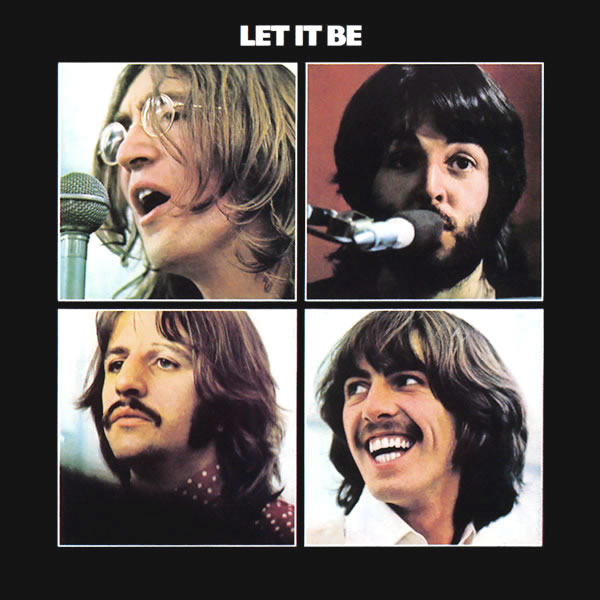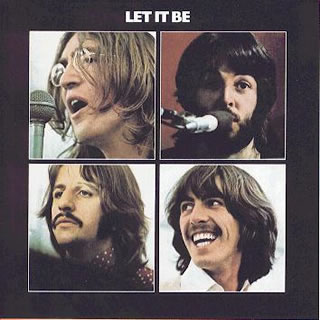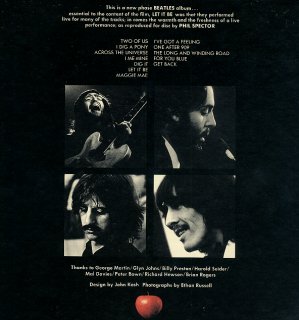|
Previous / Next
UK album |
 |
Let It Be
First released: 1970, May 8 Buy
|
| Covers |
|---|



|
| Additional information | ||||||||||
|---|---|---|---|---|---|---|---|---|---|---|
Songs recording date and information:
The Beatles thirteenth and FINAL official album release, which was the "soundtrack" to their fourth film. In the U.K. the Let It Be album was first issued as a Box Set ONLY - six months BEFORE being released as a single album with a catalogue number of PXS 1, although this number does NOT appear on the package anywhere. The box set contained the L.P. plus a paperback book called "The Beatles Get Back", which contained stills and dialogue from the film (some of it unused in the final print). The paperback is large and glossy at 11 inches by 8 and a half with 164 pages, but is quite delicate and is prone to fall apart if one is not careful. The photographs are by Ethan A. Russell, and the text is by Jonathan Cott and David Dalton. The story behind the conception and recording of "Let It Be" is long and complex. But basically, The Beatles intended to be filmed practising, rehearsing, recording and finally performing new songs. With the project starting at the end of 1968, and this album not being released until mid-1970, the songs recorded went through many changes and also became the most bootlegged songs in history ! The original L.P. was "finished" at the end of May 1969 and entitled "Get Back - with Let It Be and 11 other songs", this version was rejected by the Beatles, even though they even prepared the cover. This included recreating the "Please Please Me" pose on the E.M.I. balcony, which wasn't a wasted shoot, as this was eventually used on the 1973 compilation "Red" and "Blue" albums. The rear of the cover has the following note: The package was designed by John Kosh, and with hindsight is a fitting epitaph with it's black and sombre feel for the last Beatles album. Everyone has a view about Let It Be . Most critics and fans feel the album to be a shoddy work, patchy in quality and well, well over-produced by Phil Spector. George Martin was reportedly shocked and stunned when he heard what Spector had done to the Get Back tapes. Glyn Johns has poured nothing but scorn and vitriol on Spector's production. Most importantly of all, Paul McCartney was highly aggrieved with Let It Be , and not just with Spector's production techniques. He disliked the whole package, which included a lavish book [no longer sold] which added 33% to the retail price, and what he viewed as the "blatant hype" on the back cover of the LP, the like of which he felt had never before been qmployed to sell a Beatles record. But Paul McCartney's main grouse was with The Long And Winding Road - indeed he even quoted this song in his High Court action to dissolve the Beatles' legal partnership, using it as an example if how the other Beatles were trying to ruin his personal reputation. Spector's extensive layering of a heavenly choir, strings and brass had taken a simple piano ballad into the world of Mantovani. While Paul was by no means averse to employing orchestras he always used them "dry" and with subtlety. Paul claims, still, that he was not given the opportunity to approve or disapprove of Spector's work, and that the first time he heard the album was after its release. John Lennon abd Phil Spector both deined this, and Specotr claimed to hold a telegram from Paul approving of the mixes. In fairness to Spector, he did precisely what John Lennon and George Harrison had commissioned him to do: make a package suitable for public release and to accompany the film [world premiere in New York, 13 May 1970]. The best producer in the world or not, he couldn't re-write or re-record the songs, which were mostly if second-class of Beatles standard, recorded at a times of boredom, arguments and intense bad feeling within the group, recorded on borrowed sound equipment, deliberately devoid of the superior studio polish so characteristic of the Beatles' post-1965 output. True, everyone felt that Let It Be was shoddy, but had either of the two Glyn Johns albums been issued public reaction may have been even more hostile. John Lennon thought that Spector did the best possible job, that he "worked wonders" with Across The Universe , gernerally tightened up the LP and make it listenable to. "He was given the shittiest load of badly recorded shit with a lousy feeling to it ever, and he made something out of it." [ Roling Ston 1970, published 1971.] Those who accuse Spector of destroying the original Get Back premise - a simple, straightforward album, no overdubs, no edits, no orchestras - should also consider that it was the Beatles themselves who first betrayed the concept, recording overdubs on 30 April 1969 and 3-4 January 1970, and that the second Glyn Johns album in particular, compiled at the Beatles' request on 5 January 1970, included overdubs too. It was just this very type of non-creative bickering which brought the Beatles era to a sad and bitter close. But the Beatles' recordings of the years 1962-1970, the greatest, most memorable and most remarkable song catalogue in the history of popular music, will live on forever. - Mark Lewishon "The Beatles Recording Sessions"
|
